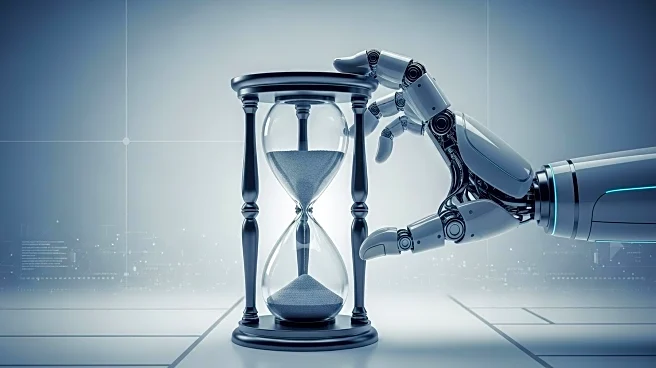What's Happening?
Geoffrey Hinton, known as the 'godfather of artificial intelligence,' has issued a stark warning about the potential impact of AI on the workforce. In a recent interview, Hinton expressed concerns that AI could significantly increase corporate profits at the expense of widespread unemployment. He highlighted that the use of AI by wealthy individuals to replace human workers could lead to a dramatic rise in profits for a few, while making the majority poorer. Hinton's pioneering work in machine learning has been foundational to the current AI revolution, and he cautions that the world is entering uncharted territory with AI's potential to destabilize economies. His concerns are echoed by Roman Yampolskiy, a computer science professor, who predicts that AI could eliminate 99% of jobs by 2030, affecting even highly skilled professions.
Why It's Important?
The warnings from Hinton and Yampolskiy underscore the urgent need for discussions on balancing technological innovation with human livelihoods. The potential for AI to cause massive unemployment poses significant challenges for economic stability and social structures. If AI advancements lead to the elimination of jobs, societies will need to find ways to provide income, structure, status, and community to displaced workers. The lack of a 'plan B' for such a scenario highlights the critical need for policymakers, businesses, and society to address these issues proactively. The debate over how to manage the benefits and risks of AI is crucial as it could reshape the future of work and economic systems.
What's Next?
As AI technology continues to advance, stakeholders including governments, businesses, and civil society groups will need to engage in discussions about regulatory frameworks and policies to mitigate the potential negative impacts on employment. There may be increased calls for measures such as universal basic income or retraining programs to support those affected by job displacement. The development of ethical guidelines and oversight mechanisms for AI deployment will also be essential to ensure that the technology benefits society as a whole rather than exacerbating inequality.
Beyond the Headlines
The ethical implications of AI replacing human labor extend beyond economic concerns. There are cultural and societal dimensions to consider, such as the value of work in providing individuals with a sense of purpose and identity. The potential for AI to develop reasoning capabilities beyond human oversight raises questions about accountability and control. As AI systems become more autonomous, ensuring that they align with human values and ethics will be a critical challenge.









